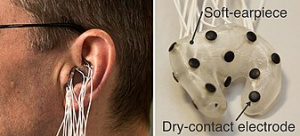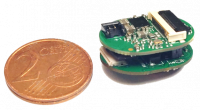EEG-based drowsiness detection
From iis-projects
Contents
Short Description
Fatigue and drowsiness pose significant risks across various industries. Statistics show that 15-20% of severe road accidents in the driving sector can be attributed to these factors. EEG-based drowsiness detection holds promise in addressing this issue. However, challenges like suboptimal signal quality, user discomfort, and limited computational capacity for advanced EEG decoding algorithms at the edge hinder the effective implementation of practical drowsiness detection systems.
This project aims to explore diverse machine learning approaches geared towards lightweight implementations suitable for resource-constrained edge devices. We'll utilize BioGAP, a compact platform for acquiring and processing biosignals, powered by GAP9, an ultra-low-power System-on-Chip (SoC). BioGAP encompasses all necessary components for measuring and processing EEG signals and can be utilized for in vivo testing.
Goal & Tasks
The main tasks of this project are:
- Literature study of EEG, focusing on drowsiness detection
- Explore different ML algorithms for EEG-based drowsiness detection
- Start with online datasets
- In a 2nd step, design your own experiment to capture EEG data during a drowsiness-inducing task
- Deploy the ML algorithm on BioGAP
Prerequisites
- Introduction to Machine Learning or ML on MCU
- Python basics
- Embedded C programming
Literature
- S. Frey, M. Guermandi, S. Benatti, V. Kartsch, A. Cossettini and L. Benini, "BioGAP: a 10-Core FP-capable Ultra-Low Power IoT Processor, with Medical-Grade AFE and BLE Connectivity for Wearable Biosignal Processing," 2023 IEEE International Conference on Omni-layer Intelligent Systems (COINS), Berlin, Germany, 2023, pp. 1-7, doi: 10.1109/COINS57856.2023.10189286.
- Kappel SL, Makeig S, Kidmose P. Ear-EEG Forward Models: Improved Head-Models for Ear-EEG. Front Neurosci. 2019 Sep 10;13:943. doi: 10.3389/fnins.2019.00943. PMID: 31551697; PMCID: PMC6747017.
Status: Available
- Looking for Semester, Bachelor, and Master Students, the project can also be implemented in a collaborative way between multiple Bachelor students
- Supervision: Sebastian Frey, Victor Kartsch, Andrea Cossettini, Simone Benatti
Character
- 15% Literature Study
- 30% System assembly design
- 25% Data processing
- 30% experiments and characterization

